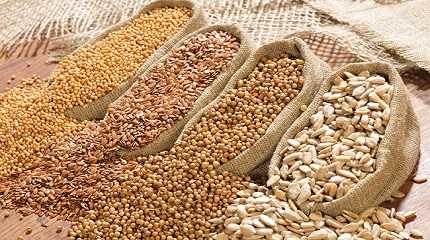
BEIJING, Mar 1 (APP): A team of young Pakistani agricultural scientists at the National Research Center of Intercropping (NRCI), the Islamia University of Bahawalpur (IUB) are researching strip intercropping technologies to help their country shrink the import bill of food commodities, especially soybean.
It was remarkable that the ongoing work there originated from their collaboration with China, but has been optimized specially for Pakistan based on the country’s realities, which has been a shining model of Sino-Pak cooperation in both scientific research and educational exchange, China Economic Net (CEN) reported on Wednesday.
Since 2018, Dr Muhammad Ali Raza, a post-doc who graduated from Sichuan Agricultural University (SAU), China, has started to promote China’s maize-soybean strip intercropping technology in Pakistan with his professor Yang Wenyu’s support and guidance, which has received a good response, particularly from local industrialists and progressive farmers in the recent years.
After years of hard work, he has become a productive agronomist and expert in intercropping research in Pakistan.
Under the vision of the IUB Vice Chancellor Prof. Athar Mahboob, the NRCI was inaugurated on August 11, 2021, to introduce strip intercropping technologies in Pakistan’s agriculture to improve crop yields and soil productivity. Now, Dr Muhammad Ali Raza acts as the Director of the centre, leading intercropping technology’s popularization in Pakistan.
To date, the centre has already developed and optimized the Chinese maize-soybean strip intercropping technology according to local conditions and conducted trials on the wheat-soybean strip intercropping.
Moreover, to further enhance resource use efficiency and land productivity from the sugar belt of Pakistan, the centre is working on developing sugarcane-based intercropping systems. Recently, the centre conducted trials of sugarcane- and wheat-based strip intercropping systems including rapeseed, soybean, clover, and chickpea as secondary crops, with developing the intercropping-specific varieties of these crops.
The centre is also researching the different row configurations, particularly the wider strips, to encourage the mechanization of strip intercropping systems with existing farm machinery in Pakistan.
Following the slogan of “Think Globally, Act Locally”, Sino-Pak cooperation is a special feature of NRCI. The centre has signed multi-dimensional MoUs with Sichuan Agricultural University (SAU), Gansu Academy of Agricultural Sciences (GAAS), and Shandong Academy of Agricultural Sciences (SAAS) to exchange resources, researchers and students, and also has initiated collaboration with the National Soybean Center (NSC), Agro-ecology and Conservation Lab, and Molecular Biology Lab at Nanjing Agricultural University (NAU).
It’s learned that the research at NRCI on the development and optimization of maize-soybean strip intercropping technology using water-saving technologies like drip irrigation is sponsored entirely by GAAS. Later on, GAAS will also help in the transfer and dissemination of the developed technology in Pakistan.
In addition, presently, there are eight researchers in total at NRCI including four agronomists, two breeders, two soil scientists, and one crop modeller, among which five graduated from top-notch Chinese agricultural universities including Sichuan Agricultural University and Nanjing Agricultural University from Chinese scholarships for their PhD studies.
Having been well groomed and trained in the strip-intercropping research and molecular physiology of the crops, they are applying what they learned in China to developing Pakistan’s agriculture sector.
“Learning from Chinese experience through bilateral cooperation would surely train and groom Pakistanis to fight against the current economic calamity. Particularly, the support of China in agricultural education and training would surely boost agricultural productivity in Pakistan, which will not only stabilize the economic condition of the country but also provide a nearby and cheaper food source to China that could reduce food security pressure on China,” Dr Muhammad Ali Raza said with the vision of achieving a win-win situation via Sino-Pak agricultural cooperation.




